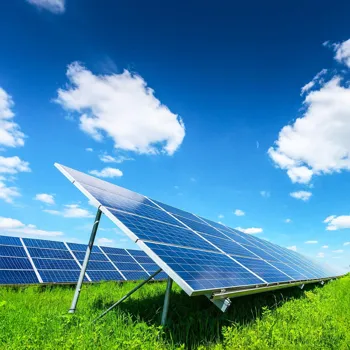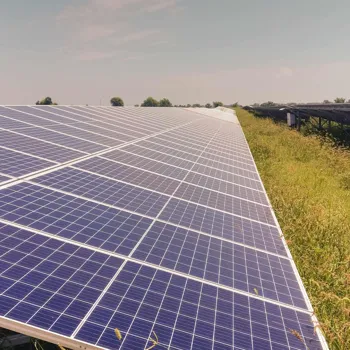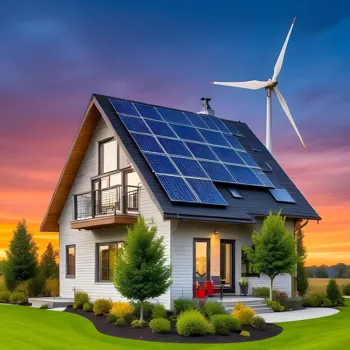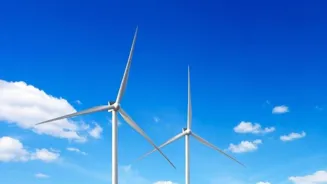Renewable Energy Revolution: India's Sustainable Future Unveiled! Dive deep into how solar, wind, and hydropower are reshaping India's energy landscape. Discover the potential, challenges, and the path
ahead
The world is changing, and so is how we get our energy. For years, we relied heavily on things like coal and oil. But these are not only finite, meaning they will run out, but also cause pollution.

Now, everyone, from big cities to small villages, is looking towards renewable energy - things like solar power, wind power, and hydropower. India, with its large population and growing economy, is right at the forefront of this change.
These sources are not only cleaner, but also sustainable, meaning we can use them without harming the planet for future generations. This shift is not just good for the environment; it is also creating new jobs and boosting the economy.
It's a win-win for everyone, and India is determined to make the most of it.
India's push for renewable energy with ambitious targets and incentives
India's commitment to renewable energy is visible in its ambitious targets. The country is aiming to have a significant portion of its electricity come from renewable sources in the coming years.

This means more solar panels on rooftops, larger wind farms in open areas, and more efficient hydropower projects. The government is actively encouraging this change by offering subsidies and incentives to businesses and individuals who invest in renewable energy.
Furthermore, efforts are being made to improve the infrastructure needed to transmit and store renewable energy, ensuring a reliable and consistent supply. It's a huge undertaking, but the potential benefits for the environment, economy, and people's health make it a worthwhile investment.
Solar energy popularity rises in India due to affordability, benefits for homes and businesses
Solar energy is becoming increasingly popular in India, both for homes and businesses. The cost of solar panels has significantly decreased, making it more affordable for ordinary people to embrace solar power.
Many homes are now equipped with rooftop solar panels, generating electricity and reducing their reliance on the traditional power grid. Similarly, businesses are installing solar systems to lower their energy expenses and reduce their carbon footprint.
Large solar parks are also being developed in various parts of the country, contributing substantially to the overall solar energy production.
This widespread adoption of solar power is not only helping India meet its renewable energy goals but also empowering individuals and businesses to become more self-sufficient in their energy needs.
Government initiatives drive India towards solar energy leadership
Government initiatives like the Jawaharlal Nehru National Solar Mission have played a crucial role in promoting solar energy. The mission provides subsidies and support for solar projects, encouraging both domestic and international investment in the sector.
These initiatives have helped to create a thriving solar industry, generating employment opportunities and fostering technological innovation. The push for solar energy is also helping to reduce India's dependence on imported fossil fuels, enhancing the country's energy security.
With its abundant sunshine, India has the potential to become a global leader in solar energy, contributing significantly to the fight against climate change.
India utilizes wind, hydropower for renewable energy growth
While solar energy is making significant strides, wind and hydropower are also playing a vital role in India's renewable energy journey. Wind energy is particularly prominent in states with long coastlines and favorable wind conditions.

Wind farms, consisting of numerous wind turbines, are being established to convert wind energy into electricity. Similarly, hydropower, which utilizes the energy of flowing water, remains a reliable source of renewable energy.
India possesses a vast network of rivers and waterways, offering huge potential for hydropower generation. Modern hydropower projects are designed to be environmentally friendly, minimizing their impact on aquatic ecosystems.
India promotes hybrid renewable energy for stable grid
The government is also focusing on promoting hybrid renewable energy projects, which combine different sources like solar and wind to provide a more consistent and reliable energy supply.
These projects can help to overcome the intermittent nature of renewable energy sources, ensuring a stable power grid. Furthermore, there is growing interest in exploring other renewable energy sources like biomass and geothermal energy, which could further diversify India's energy mix.
By harnessing a variety of renewable energy sources, India is moving towards a more sustainable and resilient energy future.
India faces challenges in renewable energy adoption: costs & intermittency must be overcome
While India's progress in renewable energy is commendable, there are still challenges to overcome. One of the main challenges is the cost of renewable energy technologies, although prices are falling, further reductions are needed to make them more competitive with fossil fuels.

Another challenge is the intermittent nature of some renewable energy sources, like solar and wind, which can fluctuate depending on weather conditions. To address this, investing in energy storage solutions, such as batteries, and improving grid infrastructure is crucial.
Renewable energy promising for India's future
Despite these challenges, the future of renewable energy in India looks promising. With continued government support, technological advancements, and growing public awareness, renewable energy is set to play a transformative role in shaping India's energy landscape.
By embracing renewable energy, India can reduce its carbon emissions, improve air quality, create new economic opportunities, and ensure a brighter and more sustainable future for generations to come.
The transition to renewable energy is not just a necessity, but also an opportunity for India to become a global leader in clean energy innovation and development.
AI Generated Content. Glance/InMobi shall have no liability for the content













